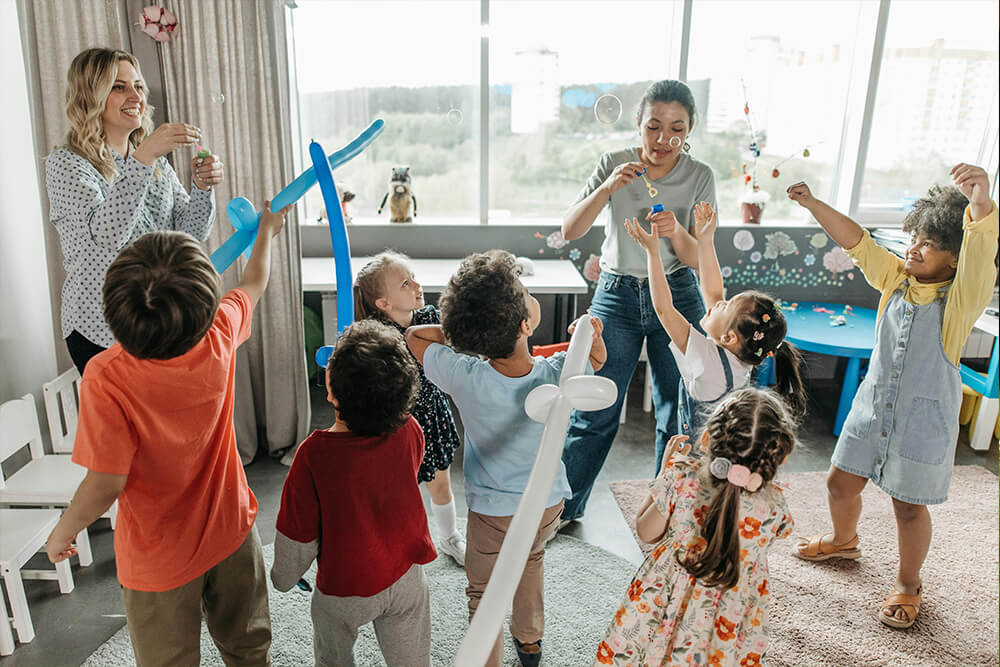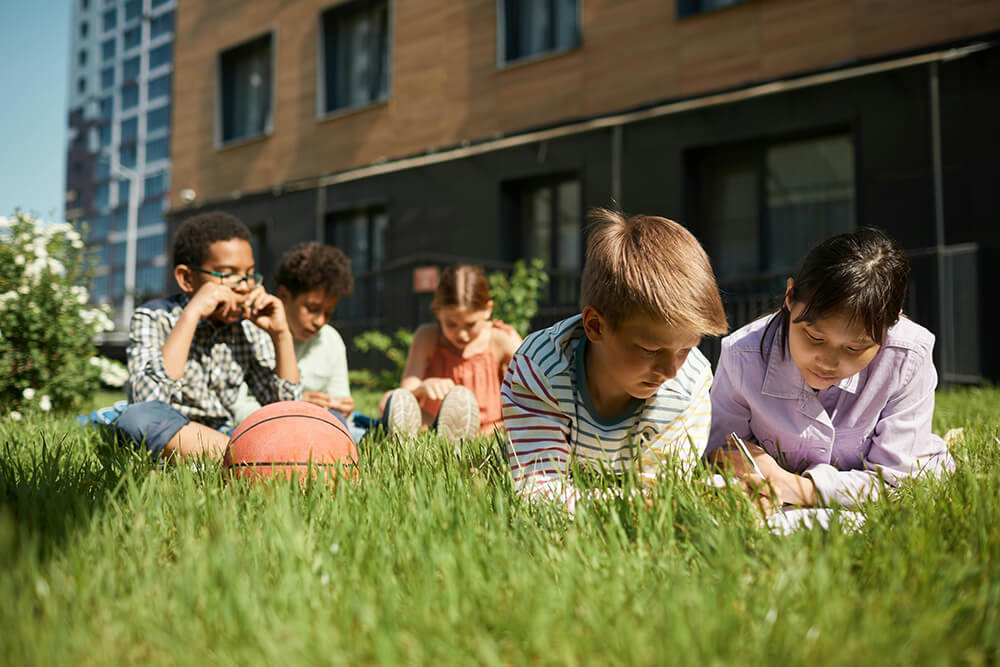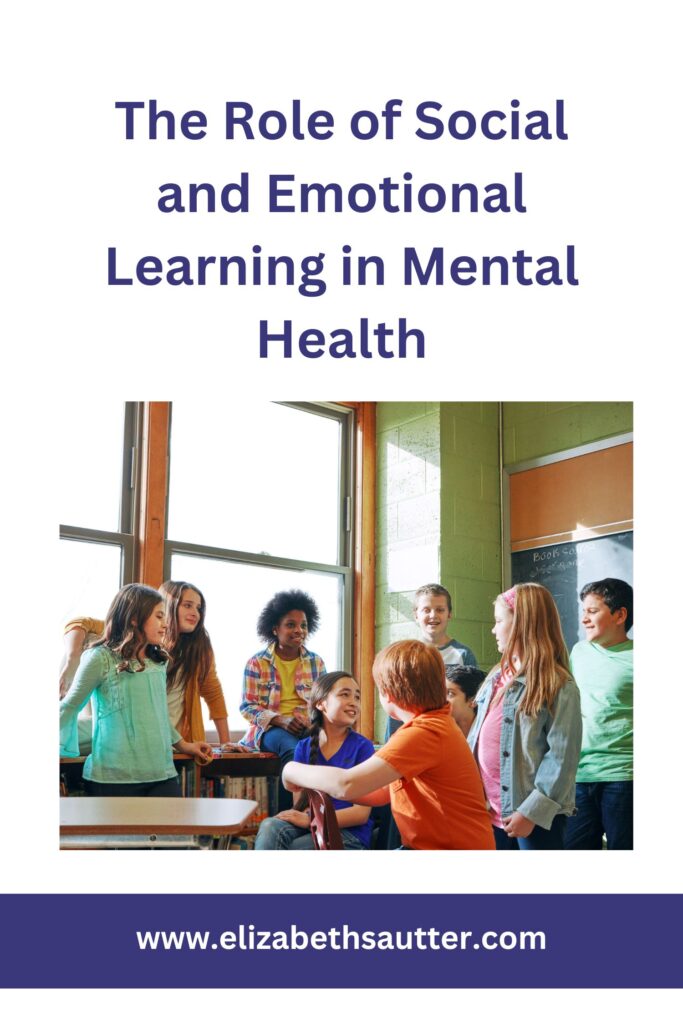As we explore the development of child and adolescence it’s important for us to talk about social and emotional learning (SEL) and the impact it can have on helping them thrive. SEL activities support the growth of emotional intelligence and self-awareness and so many more skills related to navigating social situations, emotions, academics and overall well-being.
In this article, we’ll dive into SEL’s details and its benefits. We will uncover how SEL activities can boost mental health in young people. By learning about SEL, we can help educators, parents, and communities support our youth’s mental health.

Key Takeaways
- Social and emotional learning (SEL) is a critical component of child and adolescent development.
- SEL activities support emotional intelligence, self-awareness, and interpersonal skills.
- Engaging in SEL activities can significantly improve mental well-being in children and teens.
- Incorporating SEL practices into the home, classroom and community can have a profound impact on the overall mental health of young individuals.
- Understanding the benefits of SEL empowers educators, parents, and communities to prioritize emotional resilience and mental health.
What is Social and Emotional Learning (SEL)?
Social and Emotional Learning (SEL) happens over time and is developed in nature. Building and supporting these skills are critical for kids and teens in many ways.. It helps them become more aware of their feelings and develop coping skills, build social and situational awareness to cultivate meaningful relationships and boost the ability to plan ahead and meet desired goals. SEL is also important for academics and life skills.
Definition and Key Components
SEL is can be broken down into the following areas of development:
- Self-Awareness: Knowing your own feelings, thoughts, and values and how they affect you.
- Self-Regulation: Controlling your emotions, thoughts, and actions in various situations.
- Social Awareness: Understanding others, knowing social rules, and valuing differences.
- Relationship Skills: Building and keeping strong, supportive bonds with friends, family, and others.
- Responsible Decision-Making: Making choices that are right, safe, and follow rules based on what’s fair and good.
Benefits of SEL Activities for Mental Health
SEL activities play a vital role in supporting kids’ and teens’ mental health. By focusing on self-regulation and self-awareness skills, these activities help young people understand their emotions and manage their responses, building a strong foundation for overall well-being.
Improved Self-Awareness and Self-Regulation
SEL activities boost self-awareness. They help young people understand their thoughts, feelings, and actions better. This understanding helps them manage their emotions, be more empathetic, and make better choices.
SEL also helps improve self-regulation skills. Kids and teens learn to control impulses, handle stress, build a toolbox for coping, and solve problems. These skills help kids deal with anxiety and the stressors of everyday life.
“SEL activities help young people develop the self-awareness and self-regulation skills they need to thrive, both academically and socially. These essential abilities are key to maintaining stronger mental health and overall well-being.”
When parents and educators incorporate SEL activities, they equip young people with essential skills for lasting mental health and overall well-being. For example, activities like guided journaling and breathing activities can help teens practice self-reflection and strengthen their self-regulation skills, which are key to handling stress and building resilience.

Common SEL Activities for Children and Teens
Learning social and emotional skills helps kids and teens deal with life’s challenges.. There are many fun ways to teach these important skills.
Role-playing is great for kids. It lets them practice what to say and do in different situations or act out being different people and solving problems. They can learn to handle conflicts and share their feelings.Teens might like writing or talking to a friend more. It helps them think about their feelings and release thought and emotions so they don’t get bottled up.Visual charts or coloring pages are also useful. They help kids and teens understand and talk about their feelings. This is a big step in learning to manage emotions.
SEL Activity | Target Competencies | Suitable for |
Role-playing | Empathy, problem-solving, communication | Children |
Journaling | Self-awareness, emotional regulation | Teens |
Visual supports and mindfulness coloring | Emotional awareness and intelligence | Children and Teens |
Incorporating SEL into the Classroom
Bringing social and emotional learning (SEL) into the classroom can make a big difference in students’ mental health. Teachers play a huge role in creating a space where kids can build SEL skills, like understanding themselves, handling emotions, and connecting with others.
Strategies for Teachers and Educators
One easy way to work SEL into everyday lessons is by adding activities that promote teamwork and problem-solving, like group projects. Simple mindfulness exercises, like deep breathing or short meditation breaks, can also help kids get more in touch with their feelings and reactions.
Teachers can set the tone by modeling positive social behaviors, like active listening, handling conflicts calmly, and showing empathy. These small actions help create a classroom where emotional understanding is valued and where mental health is naturally supported.
Bringing in school counselors, speech therapists, social workers, or mental health experts can be a big help, too. They can offer training and tips to make SEL even more effective, giving teachers the tools they need to meet their students’ unique needs.
FAQ
What is Social and Emotional Learning (SEL)?
Social and emotional learning, or SEL, is all about helping kids and teens develop skills that make life smoother and more meaningful. It’s about learning to understand themselves, manage emotions, and build positive relationships. Kids also learn to make smart decisions and show kindness toward others.
Why is SEL Important for Kids and Teens
SEL is essential for helping kids grow up with confidence and resilience. It teaches them life skills like self-awareness and self-control, which are crucial for good mental health, making friends, and doing well in school. These skills support them in managing stress and building strong connections with others.
What Benefits Does SEL Offer for Mental Health
SEL activities are fantastic for mental well-being. They help young people better understand and manage their emotions, build empathy, and improve relationships. Learning these skills early can make a real difference, supporting emotional stability and reducing anxiety.
Examples of SEL Activities for Kids and Teens
There are so many ways to work on SEL skills with kids! Simple mindfulness exercises, like deep breathing, help them calm down and tune into their feelings. Team-building games can improve cooperation, while activities like journaling or drawing emotions help them recognize and process what they’re feeling. There are SEL activities suitable for every age group.
How Can Teachers Bring SEL into the Classroom?
Teachers can make a big impact by weaving SEL into their daily routines. They can introduce specific SEL lessons, model positive social behaviors, and create a supportive, inclusive environment. Partnering with parents, caregivers, and other school staff helps reinforce SEL skills throughout the day, making it a shared effort that benefits everyone.
For more neurodiversity-affirming strategies, visit ElizabethSautter.com.
Discover free tools, workshops, and tips for building social-emotional skills that stick. Let’s create a world where every teen thrives—this year and beyond.
 Join the Upcoming Workshop –
Join the Upcoming Workshop – 
